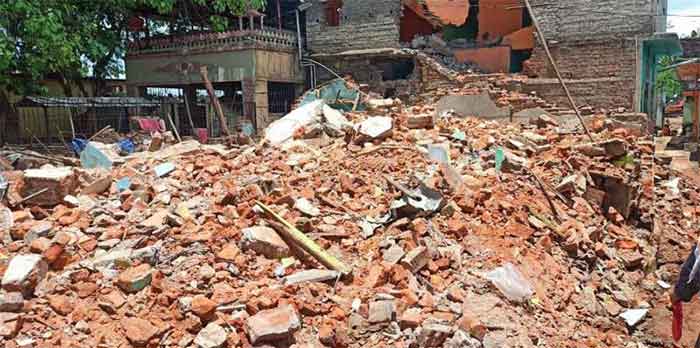
The Ghunghutipada slum in ward no.17 of Sambalpur Municipal Corporation is home to more than 200 households belonging to scheduled castes (SCs). About 400 years back the then king Rajabalaram Deo had engaged their forefathers to beat drums during temple rituals and also to maintain the cleanliness of the temple premises. Since then they have been staying over the land for generations without a record of rights (RoR). In spite of their persistent efforts to get a RoR over the land, it has been deliberately undermined by the revenue administration till date, but for others there has been very good land record settlement in the city. The constitutional promises and land reforms laws are not being executed purposefully to ensure a minimum piece of land to live a life of dignity. There has been no visible change in their livelihood and living condition as the socio-economic status remains as before with persistent victimization based on their social identity as land less, untouchables and slum dwellers. Almost all of the households live as daily wage earners mostly engaged in odd jobs; women as domestic workers and male members are construction workers, doing cleaning and sanitary work.
The so-called reservation in education and government jobs have no use for them. They all very piously carry voter cards to routinely vote to ruling parties and silently pay holding tax to Municipality and also very well in possession of their caste and resident certificate and Aadhar card in favour of their identity as citizens of this country and domicile of Sambalpur town. Not just homestead land, these slum dwellers also have been deprived of basic amenities in spite of different government schemes and provisions to ensure land, housing, drinking water, toilet, electricity and many other schemes relating to social security and the social development of the poor slum dwellers. It has been noticed that both municipality and district administration have neglected the plight of the poor and low caste people in Sambalpur. It is said that about 60 no of slums in the city and periphery lack basic amenities. The inhabitants of Gunghutipada are not just betrayed once by the revenue administration but also very well discriminated against now in the rehabilitation and resettlement plan of the state government in the SAMALEI (Samaleswari Temple Area Management and Local Economic Initiative) project.
Ironically as found in the declaration of chief minister, the government has followed two types of rehabilitation policy – one for the land owning people and temple priests and the other for land less slum dwellers, primarily scheduled castes.
How come the government officials and policy makers have such double standards while dealing with the displaced people of the same project? The land less slum dwellers package is in all respects abysmally low in comparison to others. Even the livelihood aspect of the slum dwellers has not been taken into consideration.
How come a settlement of 400 years are being simply called unauthorized dwellings? It is whose responsibility to ensure survey and settlement? Even when there is a scope to correct the grave historical mistake, the administration rather practices selective attitude against the land less slum dwellers. Why only temple priests have the opportunity of preferential treatment in matters of rehabilitation and resettlement?
Most recently, in an interaction with this writer at GhughutiPada slum, the inhabitants asked such uncomfortable questions to government referring to their centuries old suffering of last 400 years, under the rule of the then king to the present day elected governments.
Since the inception of the project they have had no peace of mind, good sleep and timely food. Most unfortunately, the formal eviction process has not been followed in case of the slum dwellers and here also formal eviction notice has not been served by the local authority. Rather, very brutally the local police demolished their houses. They were not given sufficient time to go for alternative arrangements. The school going children are women who have been suffering a lot in such a vulnerable situation. The women said that it will be very difficult for them to operate from the new place for domestic works and to shift their belongings to relocations with such meagre help from the government. “We are not opposing the temple beatification project but there should not be discrimination against us in rehabilitation and resettlement. Why are we being paid less than others as we are equally losers like others, “asked Mrs Kuni Rout,( 50), and Mr Janek Nag,(50), both residents of Basti. Mr. Pradeep Kumbhar, (42), and Manohar Kurma and many others who are struggling with court cases and petitions and street protests to get justice under the banner of Ghughutipada Basti Banchao Adolan echoed the same concerns.
Though not new, the land and livelihood issues of slum dwellers now have a new dimension with inclusion of urban temple projects which is also a major cause of displacement but the basic question of land rights remains the same in any kind of project. Here, the SAMALEI project is worth of Rs 200 crore to develop more than 100 acre of temple area by Odisha Bridge and Construction Corporation and also to generate economic activities for the locals. The project has been closely monitored by the CMO for its timely completion. The temple beautification programme of the government of Odisha is part of the larger religious revival project to match with many such central government initiatives of recent times which are being posed as promotion of religious tourism. While no one is opposing such temple beautification projects be of the central or state governments, it is rightly expected that the land less poor people around the temple must be treated humanely and their genuine rights must be recognized under the provision of law and constitutional mandates.
Manas Jena, social activist, Bhubaneswar, Odisha. Email: manasbbsr15@gmail.com
Opinions expressed within the content are solely the author’s and do not reflect the opinions and beliefs of the website or its affiliates.
Courtesy: https://countercurrents.org